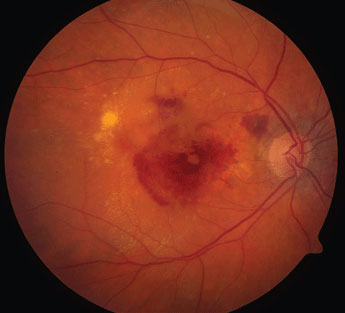 |
| It’s a physician’s duty to effectively communicate with AMD patients about the factors that might affect their disease and progression. Photo: National Eye Institute. Click image to enlarge. |
Numerous lifestyle factors, such as smoking and nutrition, can affect the progression of age-related macular degeneration (AMD), which practitioners have a duty to communicate to their patients. However, relaying health information to patients with AMD and motivating them to consequently change their behavior can be challenging, as many have difficulty understanding or retaining the information. Researchers recently explored the characteristics of effective health communication for AMD from both patients’ and optometrists’ perspectives by conducting 10 focus groups and identified several themes affecting the quality of AMD patient counseling.
A series of 10 focus groups were conducted in 2021 via web conferencing, the recordings of which were then transcribed and analyzed. A total of 17 patients with AMD and 17 optometrists were included and placed into separate groups to enable participants to speak more freely and share similar experiences. The topic guide for patients was designed to prompt them to discuss their personal experiences of accessing or receiving health information related to AMD and applying it to a behavioral change. Similarly, the topic guide for optometrists prompted them to discuss their clinical experiences delivering AMD-related health information and how various materials and methods have motivated their patients to apply the information to their lifestyle.
The results identified five themes of effective health communication for AMD: (1) material quality, (2) material relevance, (3) contextualizing for the individual, (4) contextualizing for the disease and (5) the patient’s support network.
“Participants expressed concern about the unrealistic yet common depiction of vision loss in AMD as a black patch overlying common visual scenes,” the researchers reported in their paper on the study. “They also preferred education materials tailored to a specific disease stage and the regular opportunity to ask or answer questions. Longer appointment durations and peer support (from family, friends or others with AMD) were also valued.”
The research team concluded, “Optometrists are encouraged to focus on three overarching dimensions when counseling patients with AMD in routine clinical practice: (1) curating and using disease- and stage-specific, impactful education materials, (2) their chairside verbal communication techniques and (3) AMD-specific opportunities for care coordination among patient family and friends, peers and other multidisciplinary members of the care support team.”
Wang E, Kalloniatis M, Ly A. Effective health communication for age-related macular degeneration: an exploratory qualitative study. Ophthalmic Physiol Opt. May 30, 2023. [Epub ahead of print]. |

